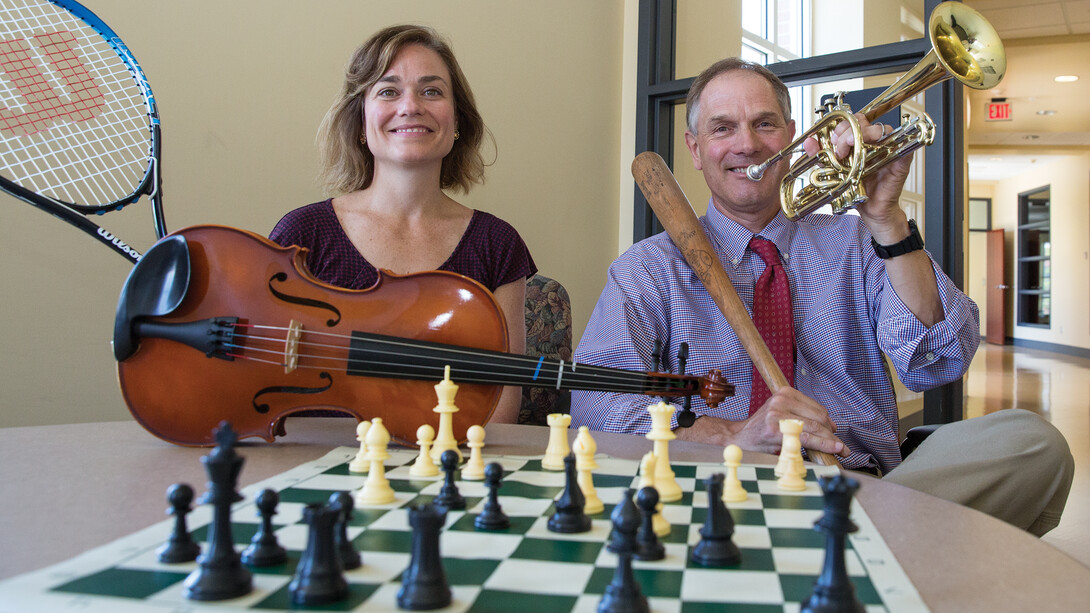
Parents want their children to succeed. Particularly if their child has the potential to become the next Taylor Swift (12 when she wrote her first song), Michael Phelps (15 when he first swam in the Olympics) or LeBron James (18 when he was drafted by the NBA).
Educational psychologist Kenneth Kiewra believes parents are the key to transforming children with aptitude into champions.
To offer guidance to parents of other future superstars, Kiewra has created “Prodigies of the Prairie,” a series of documentaries that provide first-hand glimpses of how parents interact with their talented children.
“Talent can blossom almost anywhere when growing conditions are right, and it is parents who largely determine those conditions,” Kiewra said.
Though the documentaries make it plain that nothing happens without a passionate and committed child, often it is parents who identify and support talent early. Extensive family involvement is one of four crucial factors Kiewra has identified for developing prodigy-level talent. For example, rodeo champion Jayde Atkins’ parents, J.B. and Sonya Atkins, are professional horse trainers and riding instructors. On their ranch outside Broken Bow, Nebraska, Jayde is immersed in everything she needs to become a world-class rodeo rider:
Accomplished mentors and coaches are also a key factor in talent development. Parents often serve as their offspring’s first coaches. After the child outgrows Mom’s or Dad’s coaching abilities, it is usually the parents who arrange high-caliber coaching appropriate to their child’s development level. In this example, diver Austin Alexander describes his coach, Kris Hoffman, as “almost another father:”
Parents often take on a management and administrative role in their children’s activities. Some make financial and career sacrifices to help their prodigies pursue their dreams. Kiewra says that to excel, talented youth often need to be in a “center of excellence.” Some parents move their families to cities that offer resources in their child’s talent area. Steffany Lien’s mother, Susan, regularly drove her daughter from Lincoln to Topeka, Kansas, for lessons with Bonnie Baxter, an elite baton twirling coach. Before swimmer Olivia Calegan’s father, Robert, interviewed for a job in Lincoln, he found out whether the city had strong swimming clubs and coaches. Like Susan Lien and Robert Calegan, McKenzie’s Steiner’s father, Scott, plays a strong managing role in his daughter’s softball and country music activities. He even assembled a band for her and promoted the band when she wanted to start singing professionally:
Another key factor that Kiewra has identified is extensive and deliberate practice. Parents are the ones who model and reinforce the work ethic, discipline and attention to detail their child needs to excel. Jayde Atkins’ father, J.B., stresses “fundamentals, fundamentals, fundamentals.” Baton twirler Steffany Lien’s mother, Susan, takes notes during coaching sessions and reinforces techniques when Steffany practices in the gym:
Kiewra, the father of a talented chess player, has spent more than 20 years studying talent development and has become an authority on the topic. The University of Nebraska-Lincoln professor said he has come to believe that talent is made, not born. All people are born with abilities that can be more fully developed into talents under the right circumstances.
And parents are at the heart of every element necessary for a youngster to move into elite levels of performance and competition, he said.
Kiewra and his colleague Amanda Witte collaborated with three students from the Johnny Carson School of Theatre and Film to create the documentaries, which feature six talented Nebraska youth and their families. Supported with grants from the College of Education and Human Sciences and the University of Nebraska Research Council, the project offered an unusual opportunity for film students Alexis Borchardt and Kate Westberg to gain paid experience making a documentary film, said associate professor Richard Endacott. The two young filmmakers filmed interviews and edited footage as their capstone project before graduating last year. Film student Elijah Watson made the final edits this year.
Kiewra and Witte also have written a companion research article, “Prodigies of the prairie: The talent development stories of four elite Nebraska youth performers to be published in 2018, describing the families’ experiences in more detail. A book Kiewra authored about how parents nurture talent also is upcoming. Its preface is available to read on Kiewra’s website.
As Kiewra’s son was growing up, he took what some might consider to be extraordinary steps – spending thousands of dollars on chess instruction and chess-related activities and building a supportive chess culture in the community, for example – to foster his son’s chess talent.
Along the way, he often had doubts. Was he doing too much or too little to help his son? Should he be doing this at all? He wondered why some children develop extraordinary talents while others do not. His experience led him into talent research.
Some might describe parents of the talented as “helicopter parents” or “tiger moms,” Kiewra said. But his personal experience, combined with years of talent development research, have convinced him that high level parental involvement is beneficial. Kiewra said parents of the talented should go “all in because a prodigy’s needs are almost as strong as a medical need.”
“Children cannot make the talent journey alone,” he said. “Parents are in the optimal position to foster talent. This is no easy task. In fact, it can be life-altering and require extraordinary actions and sacrifices.”
Olivia Calegan’s father, Robert, and Austin Alexander’s father, Caleb, are traveling the same talent journey for their children. They vouch that it’s worth the sacrifice to help their children chase their dreams.







